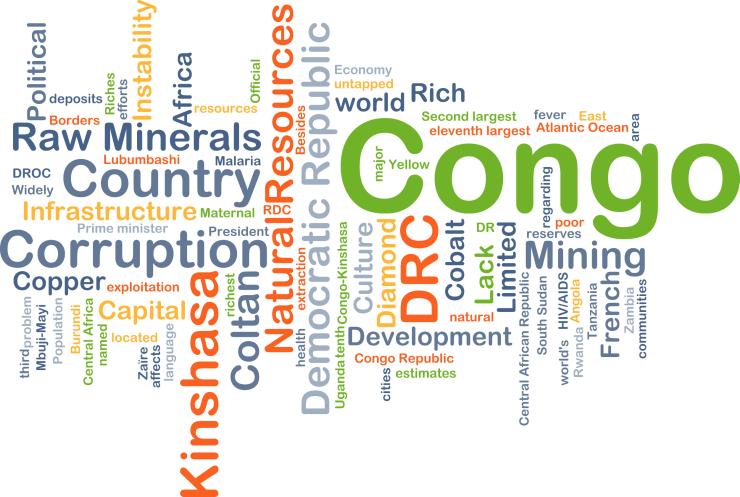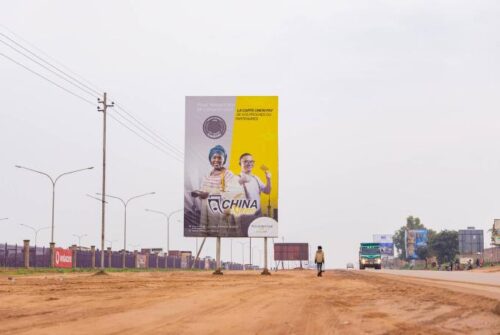DRC – China. The honeymoon is over.

The honeymoon is over between the World’s first cobalt producer, the Democratic Republic of Congo and the main consumer and producer of batteries for electric vehicles, China. The terms of the existing infrastructure-for-minerals deals may change but both countries need badly each other.
For about a year, a major conflict opposes the two main players in the world cobalt market: the DRC which provides about 70% of the world production and China, its main client which not only absorbs 80% of all Congolese mineral exports, whose companies dominate the Congolese mining scene. A new peak was reached on 11 April 2023, when the DRC’s National Assembly called for a review of the mining agreements with China. The Assembly Speaker, Christophe Mboso, claimed that certain partners such as the Chinese, were not paying their fair share.
Mboso was referring especially to the mining contract signed between the Congolese government in 2008 and the Sicomines joint-venture which is 68% controlled by a Chinese consortium including China Railways and Sinohydro, with the Congolese state-owned company Gécamines holding the remaining 32% stake.

China is everywhere in Congo. Photo: Simon Kupferschmied/Missio
This contract gave the Sino-Congolese joint venture access to 10.6 million tons of copper and to 630,000 tons of cobalt, worth $ 90 billion against the construction by the Chinese firms of 3,500 km of roads, 3,500 km of the railway infrastructure, 31 hospitals, 145 health centres and hydropower plants. The investments foreseen by the contract referred to as the “contract of the century” were initially worth $9 billion but the amount was reduced to $ 6.5 billion after the International Monetary Fund expressed its opposition to the deal because it could accordingly generate too much debts for the Congo.
According to a report from the Congolese Inspectorate General of Finance, released in February, the dividends were not shared evenly. The Chinese companies cashed at least $10 billion from the contracts over the last decade while they built a total amount of infrastructure for only $822 million. Yet, the IGF admitted that none of the parties did violate the Congolese Mining Code.
According to the Finance Minister, Nicolas Kazadi, Sicomines is failing to pay a tax of $ 200 million on super profits revealed by an audit from the Inspectorate General of Finance (IGF) last February 2023. The Congolese authorities claim that the joint venture has to pay such a sum since this tax is not one of those exempted in the 2008 contract, including customs duties, direct and indirect taxes. The Minister also stated that this contract signed under the Joseph Kabila presidency was biased in favour of Chinese interests.

The Democratic Republic of the Congo’s President Felix Tshisekedi. Photo: Congo gov.
Furthermore, the IGF director Jules Alingete revealed “an imbroglio” in the repayment periods of the investments which served to reduce the number of infrastructure investments from $6.5 billion to $3 billion”. Owing to the wide gap between the revenues of the Chinese consortium and the benefits for the DRC, President Tshisekedi pushed for negotiations on a new settlement, with an aim to increase the investments from $ 3 billion to $20bn.Clearly, the Congolese president considers that his predecessor and his staff did not serve properly national interests. On 7 April 2023, three executives of the state-run Agence Congolaise des Grands Travaux (ACGT), which was created by the Congolese government to manage the transport and health programmes financed by the 2008 deal, were arrested on charges of embezzlement.
Furthermore, the Public Debt Expenditure Observatory (ODEP) civil society organisation accused on 12 April in a communiqué the Group of Chinese Enterprises of having tried to bribe its president, Florimond Muteba, by offering him the job of representative of its interests in the DRC. The China Embassy rejected the IGF report allegations. In a communiqué released on 17 February 2023, it termed them as “unfounded” and claimed that they did not correspond to reality. The Embassy also stressed that the contract provided a good example of a win-win partnership. It mentioned a list of projects including the 240 MW Busanga power dam, which represents an investment of $ 660 million, inaugurated in January 2022.

Kolwezi sits atop some of the world’s richest mineral reserves. Photo: CGTN
The Chinese government said it would defend the rights and interests of the Chinese companies of the Sicomines joint venture. Sicomines questioned the competence of the IGF and deplored that the IGF ignored the dispute resolution mechanism created to settle conflicts between the members of the joint venture and deplored that Sicomines was not even heard by the authors of the report. In a statement, Sicomines said that the “unjustified measures” would harm the operations of the company and thereby damage the interests of the DRC and its people.
Unsurprisingly, the coordinator of the Office for the Monitoring of the Sino-Congolese contract, Senator Moise Ekanga, appointed when it was signed by Kabila, claimed that it was a win-win deal.
“We did not negotiate on our knees”, told Ekanga to the Kinshasa-based Top Congo FM Radio. “We didn’t sell out our mining reserves to the Chinese companies. We made them available for common exploitation”, he argued.The Chinese corporations consider that the dissatisfaction on the Congolese side is largely owed to the lack of governance in the sharing of the funds they paid to the DRC state. They consider indeed that the AGCT and Ekanga are to blame after the Congolese State Control Technical Office revealed by the end of March 2023 that out of the $ 822 million released by Sicomines to finance infrastructures, only 300 million could be tracked, whereas the rest appears to have vanished.
Yet, in order to ease tensions with the Congolese authorities, China Railways accepted to disburse an additional amount of $ 500 million
said Congolese officials.

Sicomines General Manager Li Sheng posing with DRC Minister of Infrastructure and Public Works, Alexis Gisaro, in Kinshasa. Image via Sicomines.
Observers stress as well that tensions between the DRC and China over the infrastructures for minerals deal have been encouraged by the United States. In September 2021, the former US Special Envoy to the Great Lakes and Sahel, Peter Pham, endorsed President Tshisekedi’s plan to renegotiate the infrastructure-for-minerals deal. “Non-transparent agreements that swap real mineral resources for inferior or non-existent infrastructure are not in the interests of society even if they benefit those who signed the contracts,” says Pham, now a fellow at the Washington-based think tank the Atlantic Council.
Although Pham did not hold anymore any official position in the US administration when he made this statement, the Paris-based Africa Intelligence newsletter reported that the US government did put pressure on the DRC to revise the Chinese contracts. The Congolese Mining and Policy analyst, Christian-Geraud Neema, said that the review of the Chinese contracts was an unofficial condition for the US backing of an IMF financial support of $ 1.5 billion to the DRC, in July 2021.

Yet, it is not certain the tug of war will go on indefinitely. The DRC and the Chinese find themselves indeed in a catch-22 position. They need each other as the first global supplier and first global client respectively. The Congolese Finance Minister declared on 20 February 2023, that China remained an important partner for the DRC and
would remain one for a long time.
Should the dispute continue, the consequences could inevitably affect world markets. In September 2022, the Kinshasa government suspended contractual tax exemptions on Sicomines imports. This might impact negatively Sicomines’ production levels which reached 155,000 tons of copper and 886 tons of cobalt in 2020 while the financing of infrastructures could decrease substantially and the business climate could further deteriorate, warns the Chinese consortium.
Now, the dispute with Sicomines is not the only one between the DRC and large Chinese companies.
For months, there has been another row over the payment of royalties to Gécamines with the China Molybdenum Company (CMOC), its partner in the copper and cobalt Tenke Fungurume Mining company (TFM).

The Tenke Fungurume copper/cobalt mine. Photo: Lundin Mining
On the 19 April 2023, a deal on this issue was signed, reported a Hong-Kong Stock Exchange filing. Such an arrangement should pave the way for the release of a $ 1.5 billion stockpile of battery metals which had been blocked since July 2022 because of this dispute. The issue was followed closely on world markets since TFM accounts for some 15% of the global production of cobalt.
In such a context, the revision of the Congolese contracts with Chinese corporations could backfire and push cobalt and batteries prices upward. Even if eventually, Australian, Canadian and South African competitors acquire stakes in the Congolese mines at the expense of Chinese miners, it is unlikely that the world batteries market structure will change significantly. Indeed, the minerals are sold anyway eventually to China which represented in 2022, 77% of the global supply and produces them at lower costs than in the US or in Europe. (Illustration: 123rf)
François Misser



